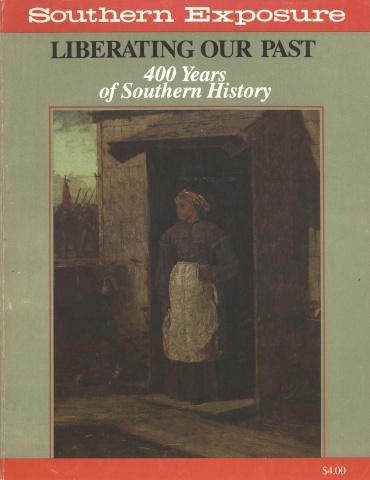Theater and History

This article originally appeared in Southern Exposure Vol. XII No. 6, "Liberating Our Past." Find more from that issue here.
Them that got shall get
Them that's not shall lose.
So the Bible says and it still is news.
Mama may have
Papa may have
but God bless the child that's got his own,
That's got his own.
— "God Bless the Child"
by Billie Holiday
It's a terrible thing, but there's a certain inevitability to the tendency for those whose need is greatest to be the ones who give the most and get the least from the process of spontaneous social reform. The '60s civil rights movement is a case in point.
I don't mean to suggest that it was not good to win those small victories that we did win. It is good that segregation in public accommodations and schools was pretty much ended. It is good that the right to vote was affirmed and that some protections were developed against employment discrimination and for affirmative action. All these things are good and need to be defended, but the fact is that most benefits from these changes in social policy don't trickle down to have substantial impact on the lives of ordinary poor people.
Ironically, pressure for the social changes comes from the bottom of the social structure and generally proceeds in spite of opposition (or with only faint support) from the social group most likely to receive the greatest benefit — the black middle class. The irony is heightened by the fact that those changes which benefit the black middle class benefit even more the whites who oppose social reform.
The members of the Play Group of Knoxville, Tennessee,* songwriter Si Kahn, and I tried to look at the way this works out in human terms rather than broad social generalities in a play called If I Live to See Next Fall. This collaborative play is based on data about a particular effort to organize the Southern Tenant Farmers Union in the mid-South during the 1930s. It focuses on the dilemma facing a white tenant farmer, Isaac Ingram, who is pressured on one side by an old boyhood friend, Buddy Bolton, to join a Klan-type organization on the promise of considerable benefits from local landowners. On the other side he's being pushed by his wife's cousin, Ella Mae Biggs, to join the racially integrated Tenant Farmers Union.
The choice Isaac faces is whether to do what is clearly the "right" thing in supporting the union or whether to do the "wrong" thing and join the Klan. If he joins the union he places himself and his family at considerable risk. If he supports the Klan, it is possible he will be well rewarded by the landowners and merchants who oppose the development of the tenant farmers union.
Organizers and community leaders face this problem in more or less dramatic terms all the time. In the absence of legal or legislative authority, the issue normally depends on the conscience of the person feeing the decision. It gets down to a question of ethics: do the needs and interests of the relevant collective take priority over the needs and interests of the individual? Another play, This Little Light of Mine, provides an interesting and entertaining example of this general problem. Written and performed by Billie Jean Young, director of the Southern Rural Women's Network, it celebrates the life of Fannie Lou Hamer, a grassroots leader of tremendous charisma and outstanding oratorical skill.
During the Mississippi Freedom Democratic Party's challenge of the Regular Mississippi delegation to the Democratic National Conventions of 1964 and 1968, Hamer became a national figure. On into the late 70s, she continued to function as a militant, progressive leader. On more than one occasion Hamer had the opportunity to advance her own personal interests at the expense of the poor people of the Mississippi Delta whose confidence and trust she enjoyed, and whose interests she represented. At no point did she violate or abuse that trust. She went to an early grave because of injuries and privations suffered as a result of her commitment to the civil rights movement, but she never wavered from the course demanded by her own deep moral commitment.
I think the problem of how ideology and ethics must necessarily complement each other is of crucial importance, and can be appreciated through the medium of drama. If we don't develop leaders and organizations with sufficient ideological insights and strong ethical foundations, it will be impossible to make the transition from the modest successes of social reform to winning profound systematic social and economic changes that are required to remove the burdens of oppression and exploitation from human society. These structural changes require personal choices — away from self-serving personal advancement and toward a commitment to the collective welfare. The difficulty of such choices and their importance to the history of the success and failure of social change movements is the appropriate subject of some of the best drama now emerging from the South.
* The Play Group has faded away, but some of its members, under the leadership of Mac Pirkle, have relocated in Nashville, Tennessee, and recently mounted a new production of the play with considerable success.
Tags
John O'Neal
John O'Neal was a co-founder and director of the Free Southern Theater for almost 20 years. He is currently touring the nation in his one-person play, Don't Start Me Talking Or I'll Tell Everything I Know: Sayings from the Life and Writings of Junebug Jabbo Jones. (1984)
John O ’Neal is co-founder and director of the Free Southern Theater in New Orleans. O’Neal’s one-person play, “Don’t Start Me to Talking Or I’ll Tell Everything I Know, ” is currently touring the country. (1981)